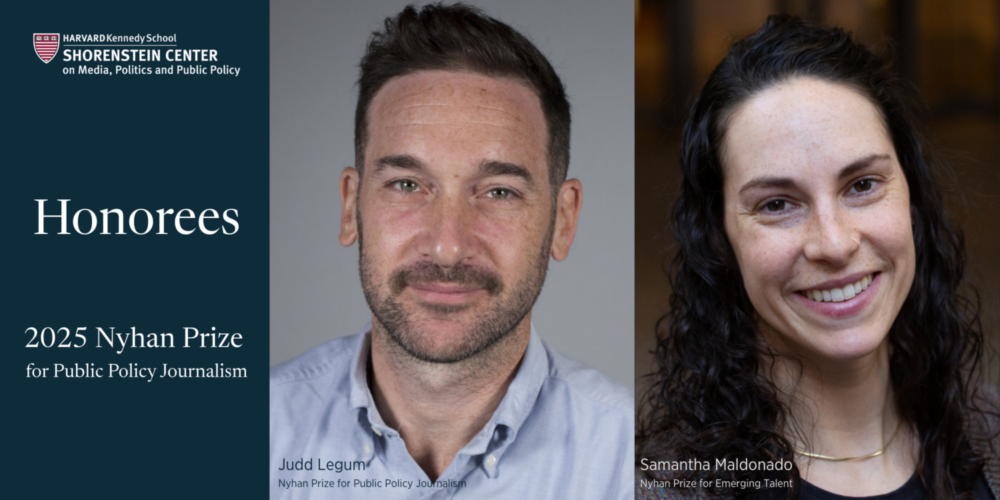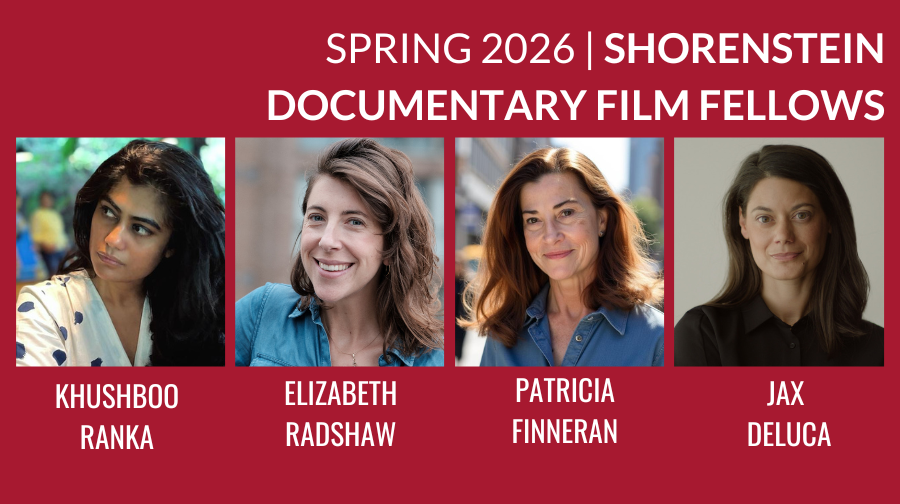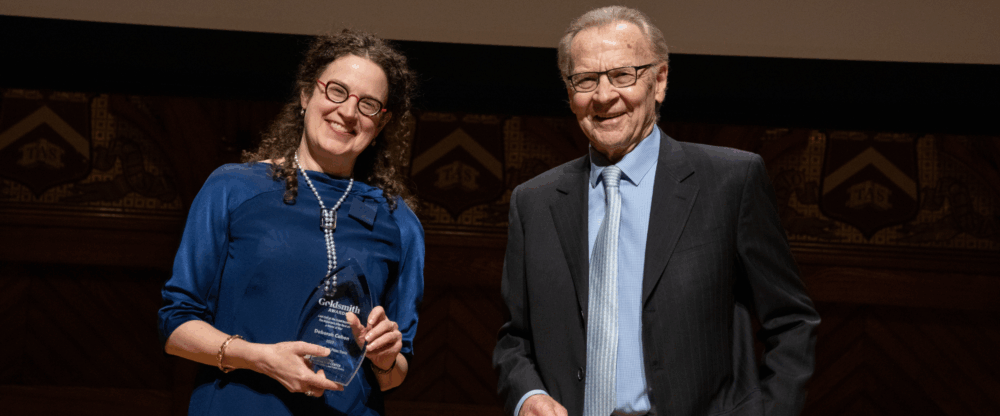
Center News
Judd Legum and Samantha Maldonado win Nyhan Prizes
Newsletter
Dear Friends of the Shorenstein Center,
Bob Hope once said, “I grew up with six brothers. That’s how I learned to dance—waiting for the bathroom.” Well, after an incredibly intense election season, I feel a little like that: listening to all of our speakers over the course of the fall semester, anxiously anticipating what shape our national politics might take, I feel like I learned to think. Below, we take a look back at the perspectives shared by some of the visitors to the Shorenstein Center over the last fourteen weeks, in the unlikely event you have a continued appetite to read and listen to more talk about the election.
I’ve got a lot of grading left to do, but I’ve also lined up a reading list for the next few weeks to try to understand how entertainment—and specifically reality television—shapes our culture, our politics, and our reporting. I’m looking for recommendations, but for starters I’m re-reading Neal Postman’s Amusing Ourselves to Death and Neal Gabler’s Life: The Movie—How Entertainment Conquered Reality. Send me any other ideas you might have.
As the snow beings to fall here in Cambridge, the Media & Politics Must Reads newsletter will resume in January, and our event series will resume in February. Meanwhile, you can catch up on more of our past events through our podcast, which is available on iTunes, Google Play, iHeartRadio, and Stitcher.
But before I sign off for 2016, I want to spend a moment in gratitude—thanking you, the Shorenstein Center community, for your attention, suggestions and encouragement in my first semester as Director. (A small gift for you: this poem, Dear Reader by Amy Gerstler.) I also want to thank Communications Manager Nilagia McCoy for all of her hard work pulling this email together each week—she is exceptional, and an important part of our success.
Thank you, and see you in 2017—with whatever surprises and delights the new year might bring.
Nicco Mele
Director, Shorenstein Center
Larry Wilmore: “Trump, he got white people to the polls like they were voting for the first white president.” This year’s Theodore H. White Lecture on Press and Politics was delivered by comedian, producer, and writer Larry Wilmore, who brought his irreverent perspective on the election and laughs to the Harvard Kennedy School.
Bob Schieffer: “What I didn’t understand was the people who were for Donald Trump—we took him literally, they didn’t.” The Theodore H. White Seminar on Press and Politics examined why the press missed the outcome of the election, and considerations for coverage moving forward. With Bob Schieffer, Walter Shorenstein Media and Democracy Fellow; Nancy Kaffer, columnist for Detroit Free Press; Derrick Z. Jackson, Joan Shorenstein Fellow and Boston Globe essayist; Michael Tomasky, special correspondent for The Daily Beast; and Nicco Mele, director, Shorenstein Center (moderator).
Joy-Ann Reid: “[Trump] exemplifies the impotent rage of people who say ‘why do we keep losing to this man who is not the president and who shouldn’t be there.’” Joy-Ann Reid, host of MSNBC’s “AM Joy,” discussed how Barack Obama’s election led to the rise of Trump, the role of race within the Republican and Democratic parties, and the need for the U.S. to reckon with its history.
Amy Walter: “The polarization that is going to come from this campaign is going to be deeper and wider than anything we’ve seen in our lifetimes.” Amy Walter, national editor of The Cook Political Report, discussed the divisions in the U.S., as well declining trust in institutions.
Patrick Ruffini: “An increasingly less white electorate is contrasted against Trump’s activation of white working class voters.” Patrick Ruffini, co-founder and partner of Echelon Insights, a political research and analytics firm, discussed demographics, the #NeverTrump movement, conservative media, and how to improve polling.
Tim Wu: “I’m concerned about a living environment that is trying to take us away from focus, from concentration, from other people, and taking us toward mindless distraction for the purpose of advertising.” Tim Wu, author of The Master Switch and professor at Columbia Law School, discussed the historical origins of the attention economy, how people are fighting back against the encroachment of advertising, and considerations for media and technology companies.
Cathy O’Neil: “Data science algorithms sorted the world into winners and losers, and the losers sometimes didn’t even know that they had been scored.” Cathy O’Neil, data scientist and author, discussed how some algorithms can have an invisible, but important and destructive impact on people’s lives.
Jeffrey Rosen: “Algorithmic review can pose grave threats to free speech.” Jeffrey Rosen, president and CEO of the National Constitution Center, delivered the annual Salant Lecture on Freedom of the Press and argued that Twitter, Facebook, and Google are facing increased pressure to moderate content in a way that is inconsistent with First Amendment protections.
Zeynep Tufekci: “Governments…don’t really censor as efficiently now. What they do instead is drown you in information.” Zeynep Tufekci, a New York Times opinion writer who focuses on the social impact of technology, discussed the advantages and shortcomings of the use of technology in protest movements around the world, and how governments are counteracting these efforts.
Sign up to receive Media and Politics Must Reads in your inbox each week. Also connect with us on Twitter and Facebook for more updates.

Center News

Center News
